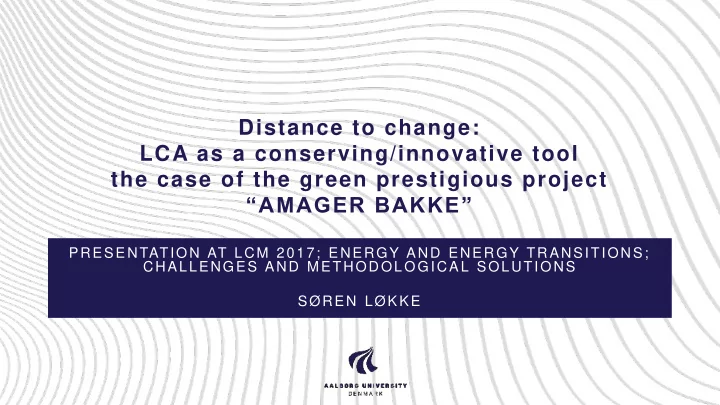

Distance to change: LCA as a conserving/innovative tool the case of the green prestigious project “AMAGER BAKKE” PRESENTATION AT LCM 2017; ENERGY AND ENERGY TRANSITIONS; CHALLENGES AND METHODOLOGICAL SOLUTIONS SØREN LØKKE
A vision of an incineration plant!
The case in five points • Incineration plant worn out • Meanwhile: waste strategy becomes resource strategy • Copenhagen Municipality: new plant needs to be ‘not too big’, • The public company insists in building a large capacity plant and succeeds • With finished plant, waste volumes low, waste-import necessary for plant economy. WHAT role did LCA play?!
Events in the AMAGER BAKKE project EVENTS IN DECISION PROCESS ASSESSMENT DOCUMENTS LOBBY PROCESSES
EVENTS IN DECISION PROCESS ASSESSMENT DOCUMENTS LOBBY PROCESSES
EVENTS IN DECISION PROCESS ASSESSMENT DOCUMENTS LOBBY PROCESSES
The general system modelled in the relevant screenings
Devil in the details… • Modelling of avoided Heat and electricity: what future?
Devil in the details… • Modelling of avoided Heat and electricity: what future? Incineration scenario 1 Incineration Incineration scenario 3 scenario 2 Danish Average district heating Natural Gas district CPH district heat network Scenario- heating name Country average marginal supply according to the Danish Concealed calculation on Substituted Energy agency. Predominantly coal: specific Copenhagen marginal: electricity 960 g CO 2 /kWh & 720 kg CO 2 /Ton waste 1031 g/kWh & 719 kg CO 2 /Ton waste Country average marginal Natural gas: Concealed calculation on Substituted supply according to the Danish 240 g CO2e / kWh & 500 specific Copenhagen marginal: district heat Energy agency. Predominantly kg CO 2 /Ton waste 20 g CO2 /kWh & 190 kg coal: CO 2 /Ton waste 200 g/kWh & 415 kg CO 2 /Ton waste Assumed transported to Sweden with a net avoided 2.4 kg CO2 per kg metal & 60 kg CO2/Ton Substituted metal
Devil in the details… • Modelling of avoided Heat and electricity: what future? • Avoided electricity production: 1 kg CO 2 /kWh – is it reasonable to model avoided electricity as pure coal? • Actual electricity mix (containing constrained technology) gives approx. 0.5 kg CO 2 /kWh • Long term marginal is in Denmark is 80% wind 7% wood 13% photovoltaic, giving a very low marginal supply (current tech: 9 g CO 2 /kWh)
Devil in the details… • Modelling of avoided Heat and electricity: what future? • Avoided electricity production: 1 kg CO 2 /kWh – is it reasonable to model avoided electricity as pure coal? • Actual electricity mix (containing constrained technology) gives approx. 0.5 kg CO 2 /kWh • Long term marginal is in Denmark is 80% wind 7% wood 13% photovoltaic, giving a very low marginal supply (current tech: 9 g CO 2 /kWh )
Devil in the details… • Modelling of avoided heat and electricity: what future? ?
Actions not taken… • EIA does not contain LCA-information even though: A EIA shall demonstrate, describe, and evaluate the plant's direct and indirect effects on: • human beings, fauna and flora • soil, water, air, climate and landscape • material assets and cultural heritage, and • the interaction between these factors
Actions not taken… The EIA of Amager Bakke states: “At Amagerforbrænding utilized heat from incineration for production of electricity and district heating, which is distributed and resold to customers. In addition to the direct CO 2 emissions from waste incineration facility thus also contribute to CO 2 reductions at the same time in the form of electricity and district heating, displacing similar works on conventional power plants ” Faulty lifecycle thinking
Return to the modelling (being slightly unfair)
Return to the modelling
A more comprehensive approach… Preventing waste, Design for reuse, Design for recycling Waste generation High quality waste Low quality waste Avoided production Plastics/composites Plastics Electricity Production Electricity Production Incineration Metals Metals Recycling Heat Production Heat Production Metal Recycling Metal Production Bio fuels / biomaterials Biomaterials Avoided production Bottom ash
Conclusions • LCA is (wrongly) reduced to “cover -decision-makers- back”. • LCA conclusions are used in arguments beyond assumptions validity. • LCA should become integrate part of EIA. • Scenario modelling & Consequential decision-supporting approach obligatory • LCA is strong for system-analysis & proof of concept – so do it! ASK THE RIGHT QUESTIONS
QUESTIONS WELCOME LOEKKE@PLAN.AAU.DK +4521592188
Recommend
More recommend